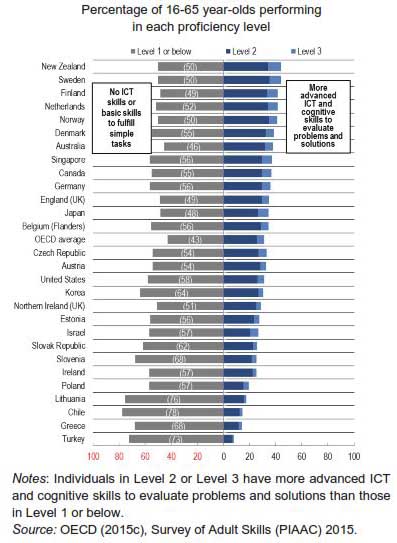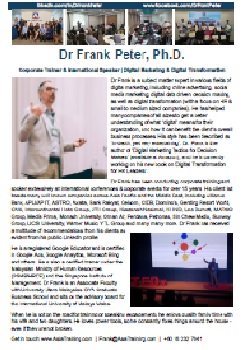The Demand for Digital Literacy Skills
In order to enter or to stay relevant in the labor market, digital literacy is becoming almost as important as being able to read, write and count. The ever-increasing use of digital technologies is constantly raising the demand for new (digital) skills. However, a substantial proportion of working adults have only limited ICT skills and/or use digital technologies inefficiently. They will need to adapt and embrace these new skill sets, or they face the great risk of becoming redundant.
Digital Skills Literacy is a basic requirement for any individual to stay relevant in the ongoing digital transformation or '4th Industrial Revolution' (IR4.0). However, a recent OECD Survey of Adult Skills shows that more than half of the working population is only able to perform the simplest set of computer tasks, or have no computer skills at all (ref. 1; see image below).

While educational institutions like schools and universities have long focused on other fundamental skills like literacy and numeracy, the teaching of digital skills is still new and underdeveloped. Given the rapid development in the digital areas, the digital literacy skills taught by educational institutions are often at risk of being outdated since it can take a year or more to design a new curriculum, having it approved and getting it implemented. By this time the learned skills may be redundant as industry needs are constantly progressing. This is sometimes referred to as the ‘race between technology and education.’ Up-to-date (digital) skills are no longer only required for ICT specialists but are important for the whole workforce. Ideally, current digital literacy should be a core component of the school curriculum together with English and mathematics. (ref. 2)
Until this materializes, educational institutions like universities will produce a large number of inadequately skilled graduates who will compete for the same job (= additional labor supply), thus keeping wages suppressed. Graduates with adequate (digital) skills will have a higher chance of not only finding a job, but they will also be able to demand better salaries (= scarcity of skilled labor).
The digital (working) environment allows for sharing and usage of information & data across departments. This requires additional skills, including the capability to process (complex) information, communicating effectively with co-workers & clients, problem-solving, advanced planning, and adjusting quickly to the constant changes. The more a business adopts digital transformation the more important these skill sets will become.
Increasing automation of business processes will result in job redundancies and displacement. As work evolves at higher rates of change between sectors, locations, activities, and skill requirements, many workers will need retraining to adjust to the new age. A major challenge will be that the need for re-skilling/up-skilling is likely to be larger for company staff that educational and training systems have more trouble reaching. Up-skilling will be part of the solution to job polarization, but workers will also need different sorts of skill-sets. (ref. 3)
While the effects on job polarization remain to be seen, there is broad recognition that the shift from routine to non-routine tasks is likely to remain a long-term feature of labor demand in the digital economy. (ref. 4)
(ref. 1) Skills for a Digital World, OECD, December 2016.
(ref. 2) Beitz, S., ‘Developing the capacity to adapt to industry transformation’, in Australia’s future workforce, Committee for Economic Development of Australia, June 2015.
(ref. 3) OECD 2017, Key Issues for Digital Transformation in the G20, G20 German Presidency/ OECD
(ref. 4) Key issues for Digital Transformation in the G20, OECD, 2017.


